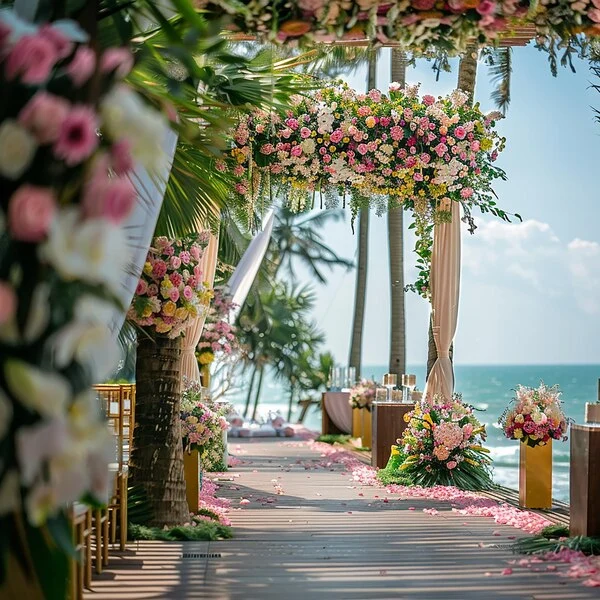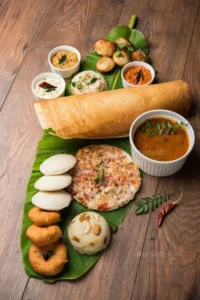
Destination weddings are always on the list of couples’ wish lists and when it comes to the South Indian wedding, color, and tradition overpower love in making this memorable event. South India boasts of some of the best locations for destination weddings from the tranquil beaches to magnificent temples.
But it entails a lot of planning, coordination, and compromise especially if it’s a destination wedding. The following are some important points to help you plan the perfect South Indian destination wedding:
Tips to Plan Your Destination Wedding
1. Choosing the Perfect Location

Plan Your Destination Wedding
As for nature, one can be fascinated by the unique landscape of South India which is provided with the backwaters in Kerala or the beach in Tamil Nadu. First, it is crucial to define the type of destination that is appealing. Beach wedding, yes, this can be arranged at Goa or Kovalam in Kerala if that is what you would like.
A traditional temple wedding involves selecting an appropriate bridal attire, using gold and jewels as ornaments and rings while the places of conducting the wedding are the grand, sacred temples of Rameswaram or Madurai. When selecting the state for your wedding, consider the place that you can both fully identify with and the place should be easily accessible for both of you and your guests.
Popular Destinations: Some of the other good places to visit are Chennai, Pondicherry, Hampi, Mysore, Mahabalipuram, and Coorg.
When choosing your venue, ensure you think about how best your guests can access your venue. Accessibility to airport, accommodation facilities as well as local transport has been noted to be very crucial. It is also useful to find out the climate prevailing in that area to ensure that you do not schedule the wedding during the rainy season or any other time that is considered very hot.
2. Setting a Budget
One important consideration is to define the budget, as needed, in destination weddings. Destination weddings can sometimes even be economical if compared to the giant weddings in the large cities, however, the expenditure can go high if not planned well. The first step is to estimate the general costs that would be incurred and then divide them into general heads such as; location, wedding decorations, catering services, accommodation, transport, entertainment, and the wedding gowns.
Tip: It is cost-saving to set some money aside to cater for such incidental costs as hiring of transport at short notice, changes of venue, or other related services.
There are also costs to consider for hiring wedding planners, travel agencies, and other local contractors who are to play a big role in the event. Specifically, make sure that you account for such costs as changes in the exchange rates when outsourcing service providers.
3. Hire a Local Wedding Planner
A local wedding planner is very useful when planning a destination wedding in South India. They know how many vendors are in the area, cultural differences, and the legal aspects of the place. Their experience can bring you the list of trustworthy providers for almost all services: from food delivery to photography, and they will be able to warn you about possible pitfalls.
Benefits: It is also evident that most local wedding planners know their favorite suppliers and venues and hence will negotiate the prices down. They also deal with organizing, which frees you up to celebrate the day that is so special to you.
A professional wedding planner will be well-placed to ensure that matters relating to a traditional South Indian wedding including particular rites or ceremonies are well-organized at the destination.
4. Plan in Advance
Destination weddings are more time-consuming to plan than conventional local weddings. One should begin planning at least one year to one and a half years before the event. This time frame ensures that one gets the venue, the vendors, and the accommodation of their choice without them being committed to another wedding or event. It also allows your guests to plan their movements and make necessary arrangements such as booking for a flight or asking for leave of absence for the event.
Key Steps to Take Early:
- Choose and reserve the wedding day and venue.
- Finalize your guest list.
- Arrange for the venues, the accommodations for the teams and traveling means.
- Make sure with photographers, caterers makeup artists, and any other vendors who are critical to the event.
- It is advisable to announce your event early enough and therefore you should prepare save-the-date cards or even electronic save-the-date messages once you set the specific wedding details.
5. Incorporating Cultural Traditions

Plan Your Destination Wedding
Some of the rituals and ceremonies that are followed in South Indian marriages include Kanyadaanam, Saptapadi, and tying the mangalsutra. These are practices that form part and parcel of the wedding and should therefore be well coordinated, especially when outside the home. Make sure that your wedding planner understands the rules and customs particular to the South Indian wedding.
Considerations:
When making arrangements for the wedding, select an area that can get to meet the certain rites that need a temple or water area for certain practices such as the Kashi yatra or pujas.
If you want to keep the traditions of your weddings then your destination wedding will also be spiritual.
6. Guest Accommodation and Hospitality
One of the main drawbacks of destination weddings is that the guests need to feel at ease and accommodated during their stay. Assure the availability of hotels meeting the different stakes of traveling populations and recognize the fact that different travelers prefer different classes of accommodation; from the luxurious hotels to the customary cheap hotels.
Tips for Hospitality:
- Move around the wedding venue and book your accommodation to avoid tight situations as regards transportation.
- The welcome gifts could be things such as itineraries, maps, snacks, and a list of the places to visit while in town to ensure that tourists do not get bored.
- Source a means of transport to transport guests from the airport or train station to their respective hotels to the wedding venue on the wedding day.
- Invite people to the wedding with a touch of personal detail like welcome dinners, local tours, and post-wedding brunches.
7. Manage Legal Requirements
When hosting a wedding in a different location, it’s essential to understand the legalities involved. Ensure that all necessary paperwork, permits, and licenses are completed in advance. Some destination venues may require specific licenses for hosting events or conducting certain rituals.
Legal Aspects to Consider:
- Confirm the legal documentation required for both religious and civil ceremonies.
- Check whether your destination requires any special permits for conducting weddings, especially if the venue is in a heritage or protected area.
- Research visa requirements for international guests or residents of other countries.
- Consult a legal expert who can help you manage these formalities and ensure that your wedding complies with local laws.
8. Catering: Blending Local Flavors with South Indian Cuisine

Plan Your Destination Wedding
Food is a highlight of any wedding, and a South Indian wedding is no exception. The culinary traditions of South India are diverse and flavorful, with an emphasis on rice dishes, curries, and sweets. When planning a destination wedding, collaborate with local caterers to offer a menu that blends regional flavors with South Indian cuisine.
Popular Menu Options:
- Traditional vegetarian dishes like sambar, rasam, dosa, and idli.
- Regional dishes unique to the wedding destination, incorporating local spices and ingredients.
- Fusion options combine South Indian and local culinary styles to offer something unique.
- Ensure that there are options for guests with dietary restrictions or preferences, and plan a diverse array of dishes for the wedding feast.
9. Weather and Season Considerations
The climate in South India can vary dramatically depending on the region and time of year. Coastal areas can be hot and humid, while hill stations may experience cooler temperatures. Monsoon season can disrupt travel plans and outdoor ceremonies, so carefully consider the best season for your destination wedding.
Best Seasons for South Indian Weddings:
- Winter (November to February) is generally the most pleasant season, with cooler weather and less rainfall.
- Summer weddings (March to June) can be hot, but indoor venues and evening events can help manage the heat.
- Avoid the monsoon season (June to September) as the heavy rains can lead to venue cancellations and travel delays.
- Research the climate of your chosen destination and plan your wedding date accordingly.
10. Create a Detailed Itinerary
Creating a comprehensive itinerary for your destination wedding is essential to ensure that everything runs smoothly. Include all the necessary information regarding dates, times, and locations for each event. This itinerary will not only guide your vendors but also help your guests navigate through the wedding events.
What to Include in the Itinerary:
- Wedding day schedule, including ceremony and reception times.
- Pre-wedding events such as the Mehendi, Haldi, and Sangeet.
- Travel information, including transport arrangements for guests.
- Local attractions and leisure activities for guests during their free time.
- Share the itinerary with all involved parties well in advance to avoid confusion or miscommunication on the big day
Conclusion
In conclusion, a destination South Indian-themed wedding might sound very challenging, but if planning to the best of detail, it can turn out to be the event of the sweetest dreams. Thus, by paying attention to the logistic aspect, the local skills of the marriage ceremony performers, and the traditions of a South Indian wedding, you will be guaranteed an unforgettable experience of the biggest day in your life. Make your guests feel as comfortable as possible, try to introduce some of the South Indian traditions into the preparation of the event, and have a great time during such an inspiring and exciting event!
Read more :
-
Celebrate Your New Chapter in Life with Elegant Wedding Decoration
-
Embracing Intimacy with Floral Decorations: A Telugu Wedding Mandap
FAQ
How do I handle language barriers at a destination wedding?
If your destination is in a region where the primary language is different from yours, hire local interpreters or bilingual wedding coordinators to facilitate communication with vendors and guests. Create wedding signage and materials in both English and the local language to ensure smooth interactions and a comfortable experience for everyone.
What are some tips for keeping South Indian wedding traditions alive during a destination wedding abroad?
If your destination is outside India, bring essential items from home like traditional attire, temple jewelry, and ceremonial items such as the mangalsutra and wedding sarees. Collaborate with local Indian communities or temples at your destination to ensure authenticity in rituals, and consider live-streaming the wedding for family members who cannot travel.
How can I manage health and safety concerns at a destination wedding, especially for elderly guests?
Research local healthcare facilities near your destination and share this information with your guests. Ensure that the venue and accommodations are elderly-friendly, with features like ramps or elevators. Arrange for travel insurance and health insurance, especially if you’re traveling abroad, and keep emergency contacts handy.



